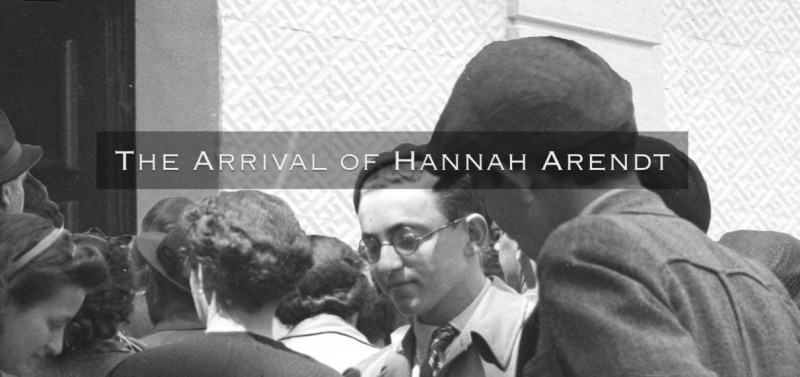
The Arrival of Hannah Arendt
This film describes the arrival of Hannah Arendt - a Jewish, German-American political theorist and publicist - in New York and her reflections on flight and helping people start over.
Wir waren eben wieder die Refugees, die sich jede Schikane gefallen lassen mußten, die dreifach arbeiten mußten, um ein Drittel des Gehaltes zu bekommen, was ein sog. Amerikaner bekommen würde. Wer oder was sind überhaupt Amerikaner? Ich zerbreche mir oft den Kopf. Im Camp habe ich meine Studien machen können, ich glaube, ich habe bei jedem Kind sagen können, woher seine Eltern einst kamen, nur die Kinder wußten es meist nicht. „Von irgendwo aus Europa“, sagten sie meistens, Kinder von Einwanderern, die einst ebenso mittellos wie wir in die Neue Welt kamen und die ihren Kindern nicht einmal erzählten, warum und wieso sie hierherkamen.
We were the refugees again, who had to put up with every kind of harassment, who had to work triple time to get a third of the salary that a so-called American would get. Who or what are Americans anyway? I often rack my brain. At camp I was able to do my studies, I think I was able to tell with every child where their parents once came from, only the children usually didn’t know. “From somewhere in Europe,” they usually said, children of immigrants who once came to the New World as penniless as we were and who didn’t even tell their children why and how they came here.
Hertha Nathorff, née Einstein (1895-1993) was a German pediatrician, psychotherapist and social worker, she published several works, including a book of poems. She was born in Laupheim (Baden-Württemberg) into a Jewish family. She was related to the physicist Albert Einstein, the musicologist and music critic Alfred Einstein, and the film producer Carl Laemmle. Nathorff attended high school in Ulm and, interrupted by a temporary job as a nurse during World War I, studied medicine in Munich, Heidelberg, Freiburg (Breisgau) and Berlin from 1914. After receiving her doctorate degree in Heidelberg (1920) and years as an assistant in Freiburg, she was a senior physician at the Red Cross Women’s and Children’s Home in Berlin-Lichtenberg from 1923-28, then worked in private practice and simultaneously at the Charlottenburg Hospital as head of the family and marriage counseling center. In the course of National Socialist racial policies, she lost her medical license in the fall of 1938, while her husband, formerly a senior hospital doctor in Berlin-Moabit, was granted a license for exclusively Jewish patients. During this period she worked as his receptionist.
Threatened with death in Nazi Germany, she organized emigration with the help of American relatives from November 1938, sending her 14-year-old son ahead to England on a Kindertransport. In April 1939 the couple managed to leave the country for London, and in early 1940 they continued their journey to New York. In New York she worked as a nurse, maid, bar pianist and kitchen help to support the family. She remained a physician’s assistant in her husband’s practice, which opened in 1942 – she did not have the time to get her degree recognized.
Hertha Nathorff took a very active part in the social life of the German-speaking exile community: she organized courses for emigrants in nursing and infant care and cultural events, was the founder of the Open House for the elderly, chairwoman of the women’s group, and an honorary member of the presidium of the New World Club. In the excerpts from the diary of Hertha Nathorff Berlin-New York Aufzeichnungen 1933 bis 1945, which we show in our archive, the author deals with her initial problems, disappointments and mortifications in the New World. She reports on the everyday life of emigrants, on the struggle for existence, on poverty and mental destruction. Despite her longing for the places of her childhood and youth, she never visited Germany again. She never really settled in America. The homesickness remained constant.
Excerpt from the diary of Hertha Nathorff, edited and introduced by Wolfgang Benz (1987): Das Tagebuch der Hertha Nathorff. Berlin – New York. Aufzeichnungen 1933 bis 1945. Schriftenreihe der Vierteljahrshefte für Zeitgeschichte, Band 54. R. Oldenbourg Verlag München, pp. 105, 189.
Translation from German to English © Minor Kontor / We Refugees Archive.